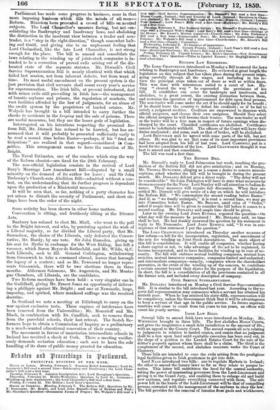Parliament has made some progress in business, none in that
more imposing business which fills the minds of all men— Reform. Ministers have presented a crowd of bills on neutral subjects. The Losd Chancellor's measure fusing, but not con- solidating the Bankruptcy and Insolvency laws, and abolishing the distinction in the insolvent view between a trader and non- trader, is a "step in the right direction," though somewhat halt- ing and timid, and giving rise to an unpleasant feeling that Lord Chelmsford, like the late Lord Chancellor, is not strong enough for the place. The bill to amend and consolidate the laws relating to the winding up of joint-stock companies is in- tended to be a correction of proved evils arising out of the dis- located state of the separate statutes. Mr. Disraeli's Civil Service Superannuation Bill is nearly identical with that which failed last session, not from inherent defects, but from want of time. Its most useful amendment on the present system is the just provision that civil servants shall count every year's service for superannuation. The Irish bills, at present introduced, deal with minor evils still prevailing in Irish law—the management of lunatic asylums and prisons, the regulation of markets, the vast facilities afforded by the law of judgments, for an abuse of the credit system by the proprietors of landed estates. Mr. Walpole has brought in a bill intended to carry further the cheeks to accidents in the keeping and the sale of poisons. These are useful measures, but they are the lesser gods of legislation.
Interrogated on his intentions respecting the promised Re- form Bill, Mr. Disraeli has refused to be hurried, but has an- nounced that it will probably be presented sufficiently early to be read a second time before Easter—perhaps, if his "fond an- ticipations" are realized in that regard—considered in Com- inittee. This arrangement seems to have the sanction of Mr. Bright.
The Naval Estimates, one of the coaches which stop the way of the Reform chariot—are fixed for the 28th February.
The non-official legislation consists in the revival of Lord Bury's Marriage Law Amendment Bill—disputed by a small minority on the demand of its author for leave ; and Sir John Trelawny's Church-rate Abolition Bill—admitted without a con- test, on the understanding that its further progress is dependent upon the production of a Ministerial measure.
It will be seen that, so far, nothing of a party character has yet arisen to disturb the serenity of Parliament, and short sit- tings have been the order of the night.


































 Previous page
Previous page